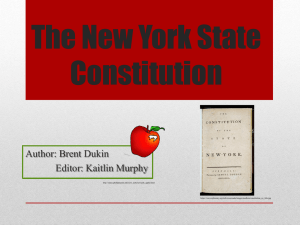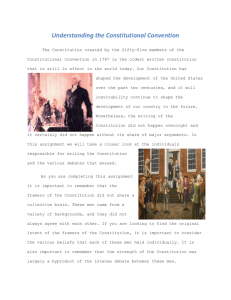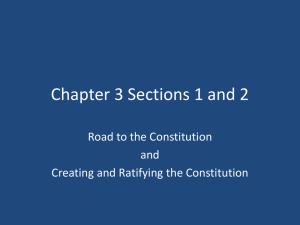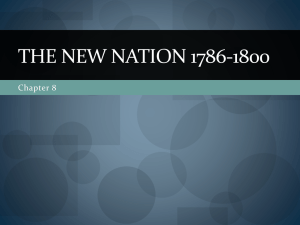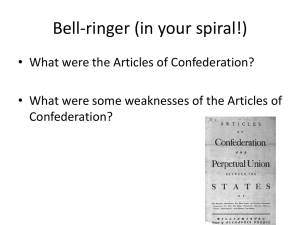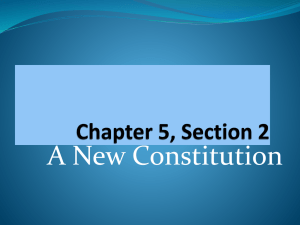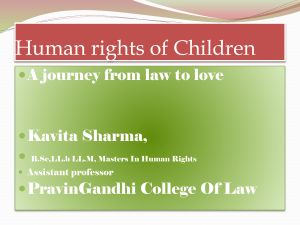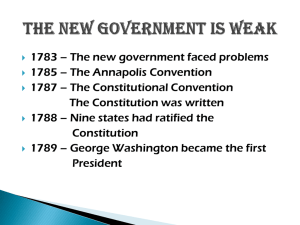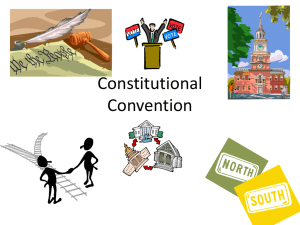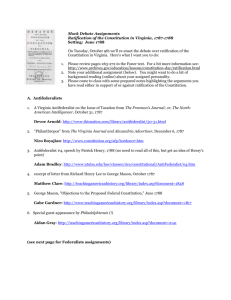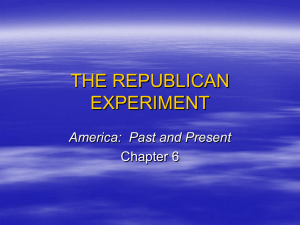"Meet the Framers" Slide Presentation Powerpoint
advertisement
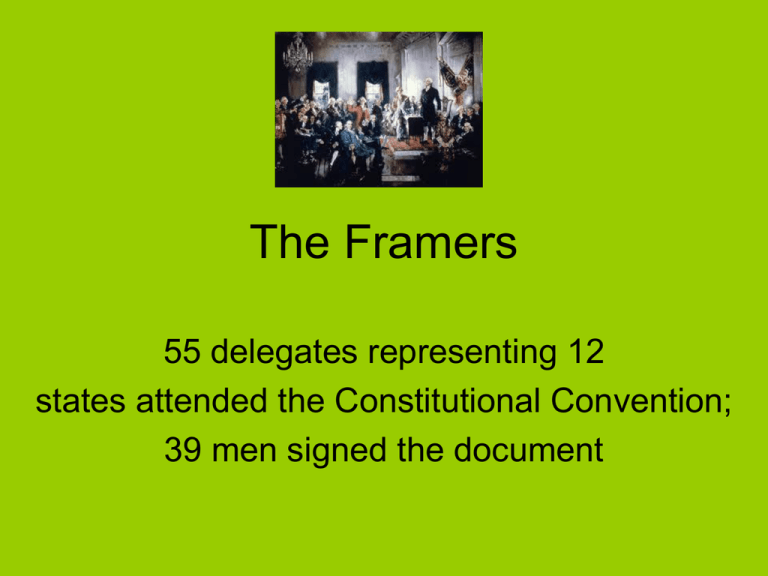
The Framers 55 delegates representing 12 states attended the Constitutional Convention; 39 men signed the document George Washington (1732 – 1799) • • • • • • No formal schooling; privately taught One of the wealthiest men in the Colonies One of the best horsemen in the colonies A workaholic who enjoyed fishing One of 12 Framers who owned slaves Supported firearms. “Firearms stand next in importance to the Constitution itself. They are the American people’s liberty teeth” • Married late in life to Martha Dandridge Custis. Raised her two children • Commander of the Continental Army • Our first president Gouverneur Morris (1752 – 1816) • Born into a wealthy New York family • Attended Columbia University • Originator of the phrase, “We the People of the United States” • One of 5 men who signed both the Articles of Confederation and the Constitution • Had a wooden leg due to a carriage accident • Was something of a ladies man, but did marry late in life at age 57. One son • Considered one of the most brilliant members of the Constitutional Convention. Spoke often and humorously • Came up with the idea of using the dollar bill as a basis for our currency • Suffered severe hardship as a consequence of his revolutionary involvement Benjamin Franklin (1706 – 1790) • Noted author, printer, political theorist, politician, postmaster, scientist, inventor, statesman, and diplomat • Invented the lightning rod, bifocals, Franklin stove, glass armonica • Founded the first lending library in America and the first fire department in Pennsylvania • Largely self-taught • Permanently estranged with his only son over the Revolution (he was a Patriot; son William was a Loyalist) • Part of the committee that drafted the Declaration of Independence • 20,000 people attended his funeral Edmund Randolph ( 1753 – 1813) • Born into a wealthy, influential Virginia family • Attended William & Mary • Was an aide-de-camp to General Washington during the Revolution • Married to Elizabeth Nicholas. Six children • Introduced the “Virginia Plan,” which favored the large states • Refused to sign the Constitution because it he believed it had insufficient checks and balances; later supported the Constitution’s ratification • Later served as the 7th Governor of Virginia; the 2nd Secretary of State; and the 1st U.S. Attorney General Roger Sherman (1721 – 1793) • Born in Massachusetts • Largely self-taught • Was a cobbler (liked to keep books open on his workbench) • Twice married. Seven children with his first wife; Eight more with his second. All but one lived to maturity • Made 128 speeches at the Constitutional Convention • Proposed the “Grand Compromise” • Sherman was the ONLY man to sign all four main documents: The Articles of Association, 1774; the Declaration of Independence, 1776; the Articles of Confederation, 1777; and the Constitution, 1787. • Suffered financial hardship as a consequence of his revolutionary involvement Alexander Hamilton (1754 – 1804) • Born in the West Indies; orphaned at a young age; difficult childhood • Self-taught; brilliant; came to America to attend Columbia University (sent by his employer) • One of Washington’s most trusted advisors • War interrupted education • Married into a wealthy and politically powerful family • Set-up the Treasury Department; established the financial footing of the new American government • Killed in a duel with Aaron Burr James Wilson (1742 – 1798) • Born in Scotland and emigrated to America in 1765; fine Scottish education • Signed both the Declaration of Independence and the Constitution, along with five other men (Clymer, Franklin, Robert Morris, Read, and Sherman) • Spoke very frequently at the Constitutional Convention • Two wives; six children • Suffered financial reverses as a consequence • Of his revolutionary activities. Almost went to debtor’s prison George Mason (1725 – 1792) • • • • • • A Virginia planter, he was active in Virginia politics and a noted lawyer Largely self-taught Created drafts of the first declaration or rights and state constitution in the Colonies Refused to sign the Constitution and worked against its Ratification because it did not contain a Bill of Rights A strong anti-federalist who wanted a weak central government Known as the Father of the Bill of Rights (along with Madison) Two wives; eighteen children James Madison (1751 – 1836) • Born into a planter aristocracy. Slave owner • Attended Princeton University • Short and small in stature; married to popular Dolly Payne Todd • One of the most influential members of the Constitutional Convention. Called the “Father of the Constitution” • We know what happened during the Convention because he took notes • Collaborated with John Jay and Hamilton in defending the Constitution and working for its Ratification. • Helped defend the Constitution against Patrick Henry, Richard Henry Lee, and George Mason • Part of a group who wanted to send slaves back to Africa, the “American Colonization Society” • Our 4th president William Paterson (1745 – 1806) • Born in Ireland and emigrated to America at age two • Attended Princeton University • Proposed the “New Jersey Plan” at the Constitutional Convention which favored the small states • A strong federalist • Helped draft the Judiciary Act of 1789 which established the federal judiciary (court system) • 2nd governor of New Jersey; Associate Justice of the Supreme Court
